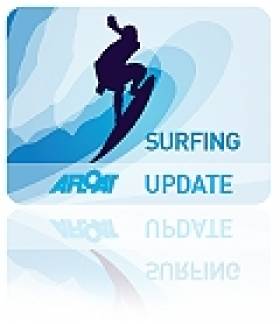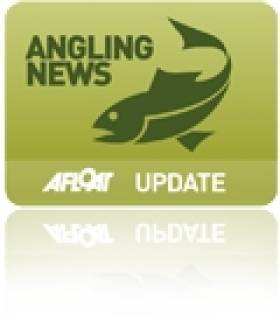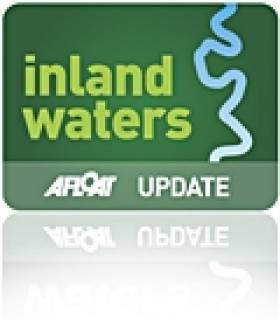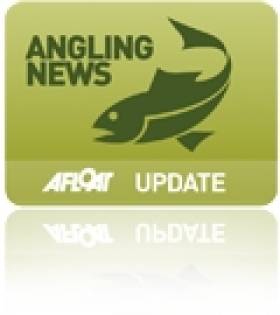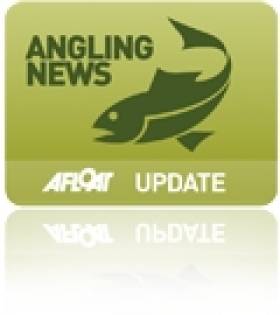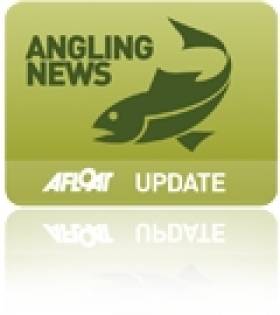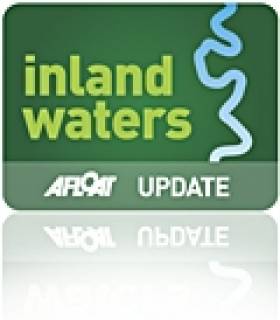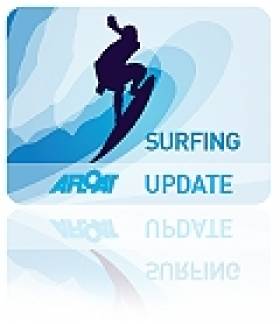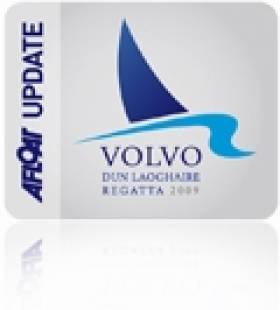Displaying items by tag: Competition
Irish Six in Peru for SUP and Paddleboard Worlds
#SURFING - A six-strong Irish team is in Peru to compete in the inaugural World Stand-Up Paddle and Paddleboarding Championships, which commence today (19 February).
The surfers have travelled at their own expense to the Peruvian capital Lima to take part in the International Surfing Association-sanctioned event, where they will contest against paddleboarders from 19 other countries.
“It is the first of its kind and we wouldn’t want to miss out," team member Paul Byrne told TheScore.ie. "The fact that it has been recognised enough to hold an international competition means stand-up padding (SUP) is here to stay.”
Dubliner Byrne first got involved in SUP in Australia, and found on his return to Ireland that he and his friends didn't need to seek out the popular surf out west to keep up with the sport - the swell produced by ferries in Dublin Port is just what they needed (see video of Dave Owens above).
Byrne joins Owens, Finn Mullen, Ed O'Farrell, Keith Gorman and Jane Downes in South America for the World Championships, which run till 25 February.
“We been competing in Europe," he says, "but it is sure to be tough against surfers who are sponsored to do it for a living.”
NI Fields First Full Team at Commonwealth Fly Fishing Championships
#ANGLING - Two Newtownabbey anglers are part of a six-man Northern Ireland team competing at the 2012 Commonwealth Fly Fishing Championships, which started yesterday in Tasmania.
The Newtonabbey Times reports that Kenny Ferguson and team captain Alan R McDade set out for the Australian island last Wednesday for the competition that runs till 19 February.
They join Campbell Baird and Harvey Hutchinson from Carrickfergus, Banbridge angler Neil Cardwell and Harry McAteer Jr from Belfast for the week-long contest.
The six - who qualified from contests held throughout Ireland organised by the Trout Anglers Federation of Ireland - also comprise the first full team that Northern Ireland has entered in the competition.
Amateur Photo Contest Celebrates Shannon's Biodiversity
#LIFE ON THE SHANNON - MulkearLIFE has launched its amateur photo competition for 2012, with a prize fund of €1,000 on offer.
The contest celebrates the 20th anniversary of the EU LIFE programme and has the theme of ‘Exploring the Biodiversity of the Lower Shannon’. Images may cover any aspect of the theme, and can be submitted in any style from macro to landscape, black and white or colour.
There is no end to what type of image can be submitted. It could be an image of water, trees, plants, fish, invertebrates, fungi, mammals, birds, lichen, domestic animals - basically any living organism.
Though not essential, images that portray biodiversity in and along rivers, streams and waterways throughout the Lower Shannon region would be preferred.
Entry is free, and entrants can submit up to three images. Prizes will be offered in two categories: Children/Young Adults and Adults.
In addition, the overall winner will receive one full day's training in wildlife and landscape photography from a leading wildlife photographer later in 2012.
Full details of how to enter the competition are available on the MulkearLIFE website HERE. The closing date is 1 May 2012 at 5pm.
Shore Angling Competition Raises Funds for Courtown Lifeboat
#ANGLING - Strongs winds and heavy seas weren't enough to dampen the spirits of the anglers taking part in the Courtown Sea Anglers RNLI fundraising event last Sunday, the Gorey Guardian reports.
Top winner on the day in the shore angling competition at Kilgorman beach was James Ryan from New Ross, who hooked an impressive 24 fish - all of which went back in the water under catch-and-release rules.
Anglers from Galway, Belfast, Clare, Wicklow, Dublin, Waterford and across Wexford took part. It is hoped that more than €4,200 was raised to support the Courtown lifeboat.
Win a Dehumidifier in the Afloat/CH Marine Facebook Competition
#COMPETITION – How would you like to win a dehumidifier to keep your boat dry this winter? You can do just that in Afloat's free to enter facebook competition in association with CH Marine. Full details to win the Meaco dehumidifer (valued at €189) are on Afloat's facebook page. Just visit the competition tab!
Slim Pickings for IWA Angling Day
There was a big turnout for the Irish Wheelchair Association's annual Angling Day recently, The Irish Time reports.
As many as 90 competitors, representing 11 angling centres across the country, staked out spots along the Grand Canal at Lucan for the seventh year running.
Gusty conditions on the day resulted in a grand total of zero catches in the three-hour competition - a stark contrast to last year's contest when more than 30 were caught and released.
But the anglers didn't let that get their spirits down, as the day was rounded off with a packed-out barbeque for competitors and volunteers.
The Irish Times has more on the story HERE.
Angling Event Raises Funds for Howth Lifeboat
A boat angling event in Dublin last week raised €1,000 for the RNLI Howth Lifeboat, The Irish Times reports.
The third annual Paul Lynam Memorial Cup catch-and-release contest, hosted by the Howth Angling Centre, saw 35 anglers from north Dublin compete in perfect calm conditions, with ray, pollack and dogfish among the haul.
Overall winner on the day was Anthony McLaughlin from Rush, who scored 170 points to lift the cup and prize money of €300 in his first big competition victory.
But the bigger winner from the event was Howth lifeboat, which was among the top five busiest in 2010.
Howth RNLI chairman Russell Rafter said: “Our collection boxes from the [Howth Angling Centre] are the highest contributor to the station.”
Nothing Fishy About Donard Pupils' Prizewinning Musical
Pupils at Donard National School fended off competition from across Ireland to win a coveted prize in the Inland Fisheries Ireland 'Something Fishy' competition for 2011, the New Ross Standard reports.
Wexford footballer Brian Malone presented fifth and sixth class pupils at Donard NS with goodie bags and an award for their entry 'Something Fishy - The Musical', which features songs and dances about the ecosystem of their local River Boro.
Dr Ciaran Byrne, IFI chief executive Dr Ciaran Byrne, who was on hand at the prizegiving ceremony at the Wexford Education Centre in Enniscorthy, commented on all entrants: “You guys are the caretakers of this environment and if you take this message with you today we will have a much better environment in 20 years’ time.”
More than 160 schools and 7,000 children took part this year in the 'Something Fishy' initiative, which is now in its sixth year of encouraging primary schoolchildren to explore different aspects of fish life.
The Irish Times has more on the story HERE.
Ireland Knocked Out of World Surfing Games
Ireland joins Puerto Rico, Switzerland, Mexico and nine other countries with all surfers eliminated from the Billabong ISA World Surfing Games in Playa Venao, Panama.
Mike Young, Ireland's sole competitor, was knocked out in the opening rounds of the open longboard competition.
After five days of heats, Australia currently leads the team ratings with 19,120 points and seven surfers still left in contention, with Brazil close behind.
The World Surfing Games continue till this Sunday 3 July.
Post-DL Regatta Event for Ultimate Bragging Rights
Competitors in this year's Volvo Dun Laoghaire Regatta are set to race for the ultimate bragging rights in a new bonus event.
The Royal Irish Yacht Club is proposing the one-day event on Sunday 31 July modelled on the ISA All Ireland Sailing Championship, where up to 16 teams will compete in a winner-takes-all contest with the prize of a significant voucher to go against their annual Dublin Bay Sailing Club subscription.
The best helms from Cruisers 1, 2 and 3, White Sails, Sigmas, Dragons, 31.7s and SB3s will compete using the symmetrical kite J80s in a round-robin fleet racing format.
Each participating DBSC class will have one team, selected by being the highest ranked DBSC boat in the Dun Laoghaire Regatta. Each class can decide if the team is chosen on a design, IRC or ECHO basis.
More details will be available in due course from the RIYC website.



























